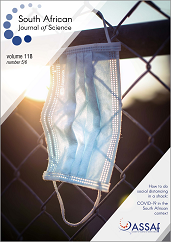Pandemic governance: Developing a politics of informality
DOI:
https://doi.org/10.17159/sajs.2022/13163Keywords:
COVID-19, governance, lockdown, informality, science, epidemiologyAbstract
South Africa had the privilege of learning from how other countries responded to the crisis engendered by the COVID-19 pandemic. However, this opportunity seems to have been lost as the South African government made the mistake of transposing a developed world preventive response onto a largely developing-world populace. The government failed to map out how factors such as South Africa’s demographic composition, spatial architecture, the incidence of poverty and informality, and competing epidemics would interact synergistically and shape epidemiological outcomes. In this article shaped by sociological insights, we show how the application of governance systems can give rise to many unintended social consequences when the knowledge forms upon which they are based are not suitably tailored to meet the needs of the specific local context. We highlight how informality can play a valuable role in fighting the COVID crisis and suggest that, to truly succeed, the government should include rather than override informal principles of governance.
Significance:
We present a brief comparative analysis of the responses of different nation states to the COVID-19 pandemic. The insights contribute to the sociological literature as well as to other disciplines, highlighting how local contextual factors are (re)shaping the form of policy responses as well as their associated consequences. More specifically, we focus on the importance of adopting a political economy approach in the analysis of informality and motivate how and why this may be useful for consideration in areas related to policy development and governance more broadly.
Published
Issue
Section
License

All articles are published under a Creative Commons Attribution 4.0 International Licence
Copyright is retained by the authors. Readers are welcome to reproduce, share and adapt the content without permission provided the source is attributed.
Disclaimer: The publisher and editors accept no responsibility for statements made by the authors
How to Cite
- Abstract 721
- PDF 989
- EPUB 540
- XML 535













.png)